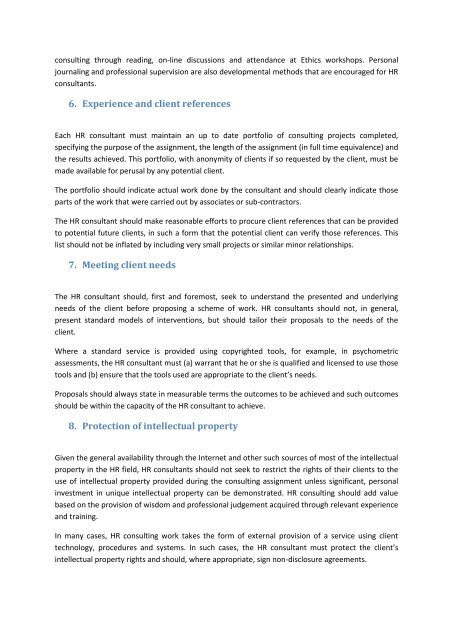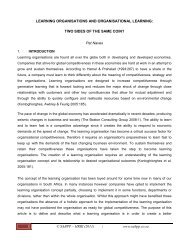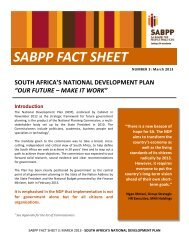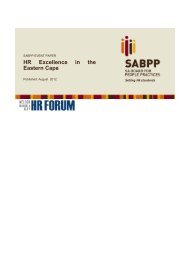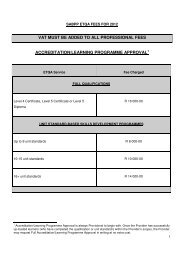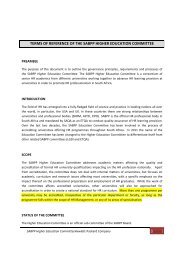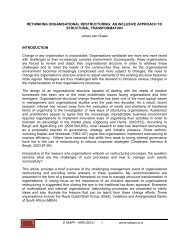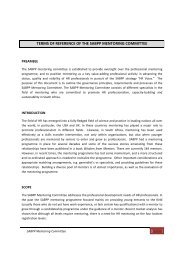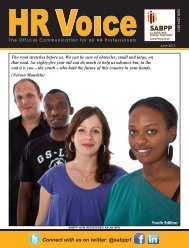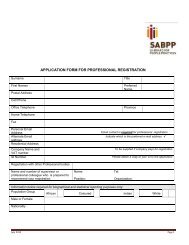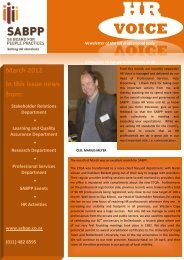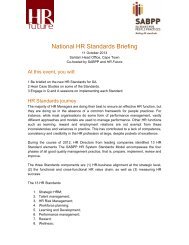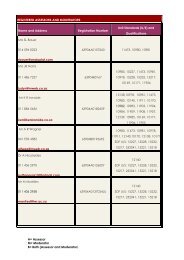Code of Ethics for HR Consultants.pdf - SABPP
Code of Ethics for HR Consultants.pdf - SABPP
Code of Ethics for HR Consultants.pdf - SABPP
- No tags were found...
Create successful ePaper yourself
Turn your PDF publications into a flip-book with our unique Google optimized e-Paper software.
consulting through reading, on-line discussions and attendance at <strong>Ethics</strong> workshops. Personaljournaling and pr<strong>of</strong>essional supervision are also developmental methods that are encouraged <strong>for</strong> <strong>HR</strong>consultants.6. Experience and client referencesEach <strong>HR</strong> consultant must maintain an up to date portfolio <strong>of</strong> consulting projects completed,specifying the purpose <strong>of</strong> the assignment, the length <strong>of</strong> the assignment (in full time equivalence) andthe results achieved. This portfolio, with anonymity <strong>of</strong> clients if so requested by the client, must bemade available <strong>for</strong> perusal by any potential client.The portfolio should indicate actual work done by the consultant and should clearly indicate thoseparts <strong>of</strong> the work that were carried out by associates or sub-contractors.The <strong>HR</strong> consultant should make reasonable ef<strong>for</strong>ts to procure client references that can be providedto potential future clients, in such a <strong>for</strong>m that the potential client can verify those references. Thislist should not be inflated by including very small projects or similar minor relationships.7. Meeting client needsThe <strong>HR</strong> consultant should, first and <strong>for</strong>emost, seek to understand the presented and underlyingneeds <strong>of</strong> the client be<strong>for</strong>e proposing a scheme <strong>of</strong> work. <strong>HR</strong> consultants should not, in general,present standard models <strong>of</strong> interventions, but should tailor their proposals to the needs <strong>of</strong> theclient.Where a standard service is provided using copyrighted tools, <strong>for</strong> example, in psychometricassessments, the <strong>HR</strong> consultant must (a) warrant that he or she is qualified and licensed to use thosetools and (b) ensure that the tools used are appropriate to the client’s needs.Proposals should always state in measurable terms the outcomes to be achieved and such outcomesshould be within the capacity <strong>of</strong> the <strong>HR</strong> consultant to achieve.8. Protection <strong>of</strong> intellectual propertyGiven the general availability through the Internet and other such sources <strong>of</strong> most <strong>of</strong> the intellectualproperty in the <strong>HR</strong> field, <strong>HR</strong> consultants should not seek to restrict the rights <strong>of</strong> their clients to theuse <strong>of</strong> intellectual property provided during the consulting assignment unless significant, personalinvestment in unique intellectual property can be demonstrated. <strong>HR</strong> consulting should add valuebased on the provision <strong>of</strong> wisdom and pr<strong>of</strong>essional judgement acquired through relevant experienceand training.In many cases, <strong>HR</strong> consulting work takes the <strong>for</strong>m <strong>of</strong> external provision <strong>of</strong> a service using clienttechnology, procedures and systems. In such cases, the <strong>HR</strong> consultant must protect the client’sintellectual property rights and should, where appropriate, sign non-disclosure agreements.


